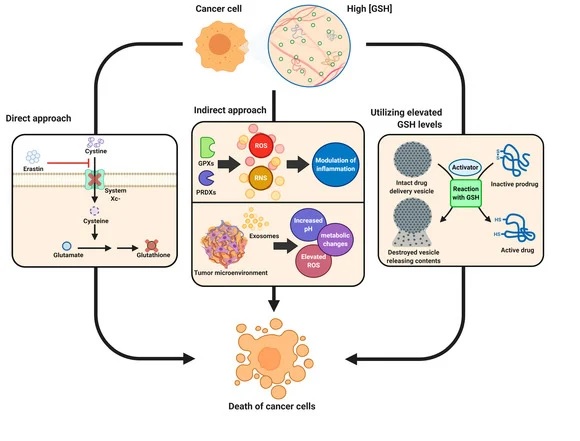Why Glutathione plays a crucial role in cancer treatment?

Glutathione (GSH) plays a crucial role in cancer treatment and chemo-resistance. Here are the key points regarding its role:GSH is an important antioxidant that helps cancer cells scavenge reactive oxygen species (ROS) and detoxify xenobiotics, including chemotherapeutic drugs. High levels of GSH in cancer cells make them resistant to oxidative stress induced by chemotherapy and radiation therapy. Depletion of GSH in cancer cells can sensitise them to ROS-based therapies like photodynamic therapy, sonodynamic therapy, chemodynamic therapy, and ferroptosis induction. It also enhances the efficacy of conventional chemotherapeutic drugs by reducing the antioxidant capacity of cancer cells.
Several strategies have been explored to deplete GSH levels in cancer cells, including:
- Inhibiting GSH synthesis by targeting enzymes like glutamylcysteine synthetase, glutathione synthetase, or γ-glutamyl transpeptidase.
- Modulating the availability of GSH precursor amino acids like cysteine.
- Using GSH-depleting agents like buthionine sulfoximine (BSO) or diethylmaleate (DEM).
- Developing nanomedicines that co-deliver GSH-depleting agents along with therapeutic drugs for synergistic effects.
Depleting GSH not only enhances the cytotoxicity of chemotherapeutics, but also overcomes multidrug resistance in cancer cells. However, GSH depletion alone is often insufficient, and combination approaches with other therapies are more effective.
Overall, targeting GSH metabolism in cancer cells is a promising strategy to improve the efficacy of various cancer therapies and overcome treatment resistance, but careful modulation is required to balance its protective and pathogenic roles.







